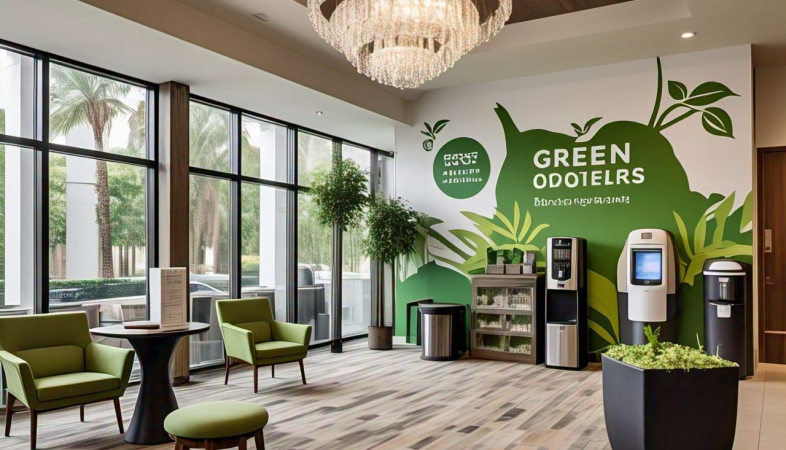How Ethical Sourcing Is Becoming a Must in the Modern Restaurant Industry
Ethical sourcing has become an essential component of modern restaurant operations.
In the modern restaurant industry, consumers are becoming
increasingly aware of the origins of their food and the impact its production
has on the environment and society. As a result, ethical sourcing has moved
from a niche concern to a mainstream necessity. Ethical sourcing refers to the
practice of purchasing ingredients and products that are produced in ways that
respect the environment, ensure fair labor practices, and promote animal
welfare. For restaurants, embracing ethical sourcing is not only a matter of
meeting consumer demand but also a commitment to sustainable and responsible
business practices that align with the values of today's conscientious diners.
The growing popularity of ethical sourcing can be attributed to several factors, with environmental sustainability being at the forefront. With the global food industry contributing significantly to environmental degradation through excessive waste, deforestation, and unsustainable farming practices, restaurants are beginning to recognize their role in mitigating these impacts. For instance, sourcing locally grown ingredients helps reduce the carbon footprint associated with food transportation. By supporting farmers who use eco-friendly practices, restaurants can offer dishes that are fresher, more seasonal, and grown without harmful pesticides or fertilizers, which benefits both the environment and the consumer.
Another key element of ethical sourcing is ensuring fair labor practices throughout the food supply chain. As awareness of worker exploitation, low wages, and poor working conditions in agriculture and food production industries rises, consumers are increasingly looking to restaurants that support fair trade and ethical labor practices. Many restaurants now make a point of sourcing products from certified fair trade organizations, ensuring that the workers involved in food production are paid fairly, work in safe conditions, and are treated with dignity. This transparency helps build trust between restaurants and their patrons, creating a sense of social responsibility that goes beyond just the food on the plate.
Animal welfare is another critical aspect of ethical sourcing. As people become more concerned about factory farming, cruelty-free practices, and the treatment of animals in the food supply chain, restaurants are feeling pressured to adopt more humane standards. Sourcing meat, dairy, and eggs from suppliers who adhere to high animal welfare standards is becoming increasingly important. Many restaurants now highlight the humane treatment of animals in their sourcing practices, opting for suppliers who raise animals in natural, free-range environments and avoid inhumane practices such as overcrowding, antibiotics, and growth hormones. This commitment not only addresses ethical concerns but also resonates with consumers who are looking for more sustainable and ethically produced food options.
The shift toward ethical sourcing is also a response to changing consumer preferences. Today’s diners are more informed and concerned about the food they consume, particularly when it comes to issues such as health, sustainability, and social impact. Many people are opting for plant-based or sustainable dining choices, driving restaurants to adapt their menus and sourcing practices accordingly. Restaurants that prioritize ethical sourcing are seen as more authentic and aligned with the values of their customers, fostering loyalty and increasing the likelihood of repeat business. Customers are not just looking for good food anymore; they also want to feel good about the food they are eating, knowing it was sourced responsibly and with care.
Incorporating ethical sourcing into a restaurant's operations does require some investment and commitment, but the long-term benefits are undeniable. By sourcing ethically, restaurants can differentiate themselves from competitors, attracting a growing segment of socially conscious diners. This can lead to improved brand loyalty, better public relations, and increased media attention, all of which contribute to long-term success. Additionally, sustainable practices such as sourcing locally and reducing food waste can also lead to cost savings, as they streamline supply chains and reduce the need for excess inventory. These savings can offset the initial cost of sourcing more expensive ethically produced ingredients.
The implementation of ethical sourcing is not without its challenges. It can require significant effort to find reliable suppliers, and prices for ethically sourced ingredients are often higher than conventional alternatives. However, the restaurant industry is increasingly innovating to make these practices more accessible. Technology plays a crucial role in helping restaurants track the origins of their ingredients and assess the sustainability of their supply chains. Apps and software tools allow restaurants to connect with certified suppliers, helping them make informed purchasing decisions and ensure transparency in their sourcing practices. Additionally, consumers are becoming more willing to pay a premium for ethically sourced food, understanding the added value it brings in terms of quality, sustainability, and social responsibility.
Ethical sourcing has become an essential component of modern restaurant operations. From environmental sustainability to fair labor practices and animal welfare, ethical sourcing helps restaurants align their business with the growing demands of consumers who want to support brands that reflect their values. By prioritizing ethically sourced ingredients, restaurants not only contribute to a more sustainable and just food system but also create a competitive edge that appeals to conscientious diners. As awareness of ethical issues continues to grow, restaurants that embrace ethical sourcing will be better positioned to succeed in an increasingly conscious and values-driven marketplace.
.png)





























